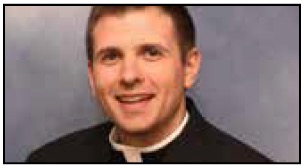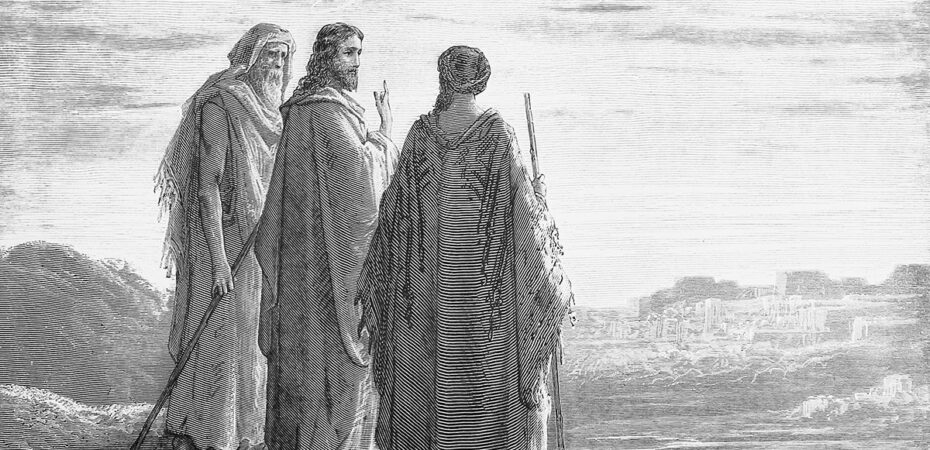When Things Disappear
The love of Christ always remains, particularly in the sacraments
Father Michael Ackerman Comments Off on When Things Disappear
 Not that long ago, a few parishioners invited me to their home for dinner. Following the meal, their two young daughters treated all those present to a fairly impressive magic show in the game room. The half-hour presentation included many disappearing acts featuring money, jewelry and even one of the girls themselves.
Not that long ago, a few parishioners invited me to their home for dinner. Following the meal, their two young daughters treated all those present to a fairly impressive magic show in the game room. The half-hour presentation included many disappearing acts featuring money, jewelry and even one of the girls themselves.
“You should try this at the parish!” the girls told me. “It probably would make people actually excited for the homily.” I thought that was particularly funny, much to the chagrin of their parents.
Those young ladies got their wish because, a few weeks later, things started to disappear at our church. One of our deacons informed me just before Advent that all of our purple dalmatics were gone. The sacristan, not more than three hours later, called me to tell me that some wine was missing, and that was quickly followed up by a case of missing votive candles.
“We either have a thief,” the secretary told me, “or David Copperfield has left Vegas and established a residency here at our parish.”
The candles eventually turned up, as did the wine, but the location of the dalmatics is known to God alone. The replacements will hopefully endure at least through Lent.
When things disappear from our lives for one reason or another, we can become bitter, angry and distraught, or we can look at it as an opportunity for God to do something new. In teaching a class for the parish on the Church Fathers, I came across a quote from St. Leo the Great about the Lord’s ascension that was especially meaningful. St. Leo wrote, “Believing souls … put unhesitating faith in what is not seen with the bodily eye; they fix their desires on what is beyond sight. Such fidelity could never be born in our hearts, nor could anyone be justified by faith, if our salvation lay only in what was visible.” St. Leo went on to say that Christ was now invisibly present in the visible sacraments. This should give us comfort in knowing that God is always with us, even when other things seem to fade. It actually may even bring unexpected healing and peace.
Our diocese, over the past several years, has undergone a reorganization that resulted in the merging and closing of several parishes. A woman called and asked to talk with me about the difficulty in dealing with the closing of her parish.
“I can’t believe my church is gone,” she told me. “I was baptized and married in that church, my children received their sacraments there, and I even buried my husband in that place. My faith has vanished!”
“I can imagine that is so hard,” I replied. “I bet you remember the great liturgies and choirs from the past.”
“No,” she retorted. “I actually did not enjoy the priests there, and the music was usually poor.”
“Oh, then I bet you miss the beauty of the architecture,” I offered.
She shook her head. “The plaster was falling and the roof leaked. The place did not even have a bathroom; it was so old.”
“Well,” I answered back, “do you miss the ministries and organizations that you belonged to?”
“Not at all,” she readily answered. “The ‘ladies of no charity’ were always difficult and belligerent. I am glad not to see them.”
“Hey,” she finally stated, “I think I am actually glad that place is gone! I don’t miss it as much as I thought. Thanks, Father. You’re a gem!”
I only looked at her in wonder and amusement.
Sometimes, things disappear, but, apparently, attitudes and melancholic feelings can also disappear. The disciples on the way from Emmaus, downtrodden over the crucifixion of Jesus, ultimately saw their sorrow disappear at realizing what God had done. “Were not our hearts burning [within us] while he spoke to us on the way?” (Lk 24:32). The joy of Christ’s resurrection overcame despair and disillusionment.
That is a good life lesson, especially as we journey through Lent. Things will inevitably come and go — money, buildings and even vestments — but the love of Christ will never disappear, and that is something we can count on to always remain.
FATHER MICHAEL ACKERMAN is the pastor at Resurrection Parish, Bethel Park, Pennsylvania, and chaplain at Seton LaSalle Catholic High School in Pittsburgh.





